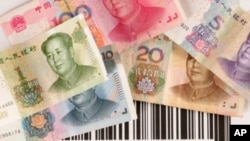The head of America's central bank says China's currency practices hinder U.S. and global economic recovery. Federal Reserve Chairman Ben Bernanke testified on Capitol Hill Tuesday, but did not specifically address a bill being debated in the upper chamber that would penalize Beijing for maintaining an undervalued currency.
At a time when the Capitol reverberates with intense and often bombastic debate on China's currency valuation, Fed Chairman Bernanke told lawmakers that, indeed, Beijing keeps the yuan artificially low, and that undervaluation has real consequences.
"The Chinese currency policy is blocking what might be a more normal recovery process in the global economy," said Bernanke.
Bernanke spoke at a hearing of the Joint Economic Committee, comprised of legislators from both chambers. He said China's currency practices contribute to sluggish economic growth in the United States and other advanced industrialized nations, which puts a damper on global expansion.
"We have a two-speed recovery where advanced industrial countries like the United States and Europe are growing very, very slowly, and where emerging market economies are growing quite quickly," Bernanke added. "A more normal, more balanced recovery would have some more demand being shifted away from the emerging markets towards the industrial economies. The Chinese currency policy is blocking that process. And so it is, to some extent, hurting the recovery process."
The Fed chief said he had no data on U.S. job losses stemming from an undervalued yuan. Senators backing a bill that would force the U.S. government to treat currency manipulation as a foreign subsidy have pointed to economic studies alleging millions of American job losses over the last decade as a result of Beijing's monetary policies.
Bernanke did not comment on the bill itself, which would trigger U.S. tariffs on Chinese goods. The bill survived a procedural vote in the Senate Monday and likely faces a final vote in coming days.
Chinese officials have denounced the legislation as protectionist, and warned of serious disruptions in U.S.-China trade ties if it becomes law.
The likelihood of the bill reaching President Barack Obama's desk appeared to diminish significantly Tuesday. The speaker of the Republican-led House of Representatives, John Boehner, told reporters he understands widespread concerns about China's currency practices. But he added he is "not sure" that congressional action "is the way to fix it", and that it is "dangerous" for Congress to tell a foreign country how to conduct its monetary policy. Bills must be approved by both houses of Congress to become law.
The Obama administration says China's currency remains undervalued, but has not endorsed the Senate bill.
Much of Federal Reserve Chairman Bernanke's testimony was devoted to the languishing U.S. economic recovery, which he said is "close to faltering" amid sluggish job growth, financially-strapped consumers, and market volatility stemming from the European debt crisis, U.S. fiscal woes, and other factors. He defended record-low U.S. interest rates and other steps taken by the Federal Reserve, and urged Congress to tackle thorny issues including federal taxation and regulation.
Fed Chief: Undervalued Chinese Currency Harms US Recovery




